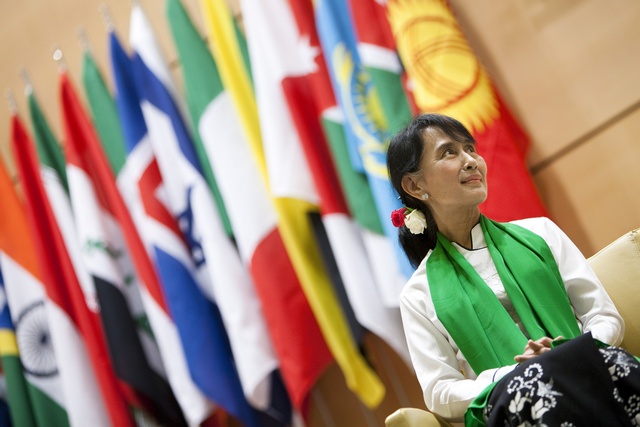Democracy icon Aung San Suu Kyi emphasised the need for “precise laws on citizenship” and “uncorrupted border vigilance” to address ongoing sectarian strife in Burma’s western Arakan state, at a press conference in Geneva on Thursday.
Speaking at the International Labour Organization’s (ILO) annual conference, she said that “fear of illegal immigration” lay at the heart of the violence between ethnic Arakanese and the stateless Rohingya minority, which has claimed at least twenty-four lives since Friday.
“Of course I am concerned and the most important lesson is the need for rule of law,” she said when asked by reporters. “We need precise laws on citizenship. I think a big problem comes from fear of illegal immigration, I think we need more responsible uncorrupted border vigilance.”
She added that those deemed worthy of citizenship, should get all the legal benefits that entails.
Ongoing ethnic strife in Burma’s western state has thrown a global spotlight on the discrimination faced by the Muslim minority the Rohingya – considered “illegal Bengali immigrants” by the government and denied citizenship, even though many of them have lived in Burma for generations.
Suu Kyi and her National League for Democracy (NLD) have come under growing pressure to outline their position on the Rohingya – seen as a hot-button political issue that risks alienating many of its supporters.
An outburst of anti-Rohingya sentiments have raged across social and mainstream media in recent weeks, while foreign and exile news outlets have faced accusations of “bias” for their coverage of the conflict.
One Facebook page called the “Kalar beheading gang”, which has over 500 ‘likes’, has an illustration of a grim reaper with an Islamic symbol on its robe on a blood-spattered background and explicit images purporting to be of victims of the unrest.
“Recent events in western Burmahave created a hurricane of hate in the online sphere,” Nicholas Farrelly, a research fellow at the Australian National University, told AFP.
Rohingya groups have urged Suu Kyi to speak out on their behalf, which analysts say places her in a “delicate” position. The ongoing violence is likely to overshadow her first trip to Europe since being incarcerated by the military junta in 1989.
In her address to the 101st ILO conference, she also renewed calls for responsible foreign investment in Burma, especially in the extractive industries.
“We accept that investments must bring profits, but we would like these profits to be shared between companies and our people,” said Suu Kyi speaking to a packed auditorium.
She urged foreign companies hoping to partner with the state-owned Myanma Oil and Gas Enterprise (MOGE) to demand better governance.
“MOGE lacks transparency and accountability at present,” she said. “The government must apply internationally recognised standards such as the International Monetary Fund’s guidelines on fiscal transparency. Other countries can help by urging their companies not to partner with MOGE without agreeing to such standards.”
She welcomed the ILO decision to lift punitive measures against Burma in recognition of the steps taken to tackle the use of forced labour. The former pariah state will receive increased technical assistance as they push ahead with their plan of action to eliminate forced labour by 2015.
The ILO’s decision is widely seen as an indicator for the further removal of sanctions against Burma. However, the move has been criticized as premature by some organisations, including the Arakan Project, which recently released a new report documenting systematic abuses carried out by the Burmese military towards the Rohingya minority group.
The group warned that there has been “little progress” since the Burmese government signed a Memorandum of Understanding with the ILO in March this year. While a reduction in the use of forced labour has been seen in certain townships of Northern Arakan state, it is has been coupled with a rise in arbitrary taxes and increased exploitation in other areas.
“It was a bit disappointing to see how quick and easy this decision has been taken, without really considering that forced labour is still very prevalent. I feel that it’s a bit too early,” Chris Lewa, Director of the Arakan Project told DVB. “The need to monitor progress carefully will be important.”
The issue of forced labour inNorthern Arakanstate is inextricably linked to the legal status of the Rohingya, which leaves them vulnerable to exploitation and abuse, added Lewa.
Aung San Suu Kyi is set to travel to Norway next to collect her 1991 Nobel Peace Prize, before visiting her former home in the United Kingdom and then France.
With additional reporting from AFP.



